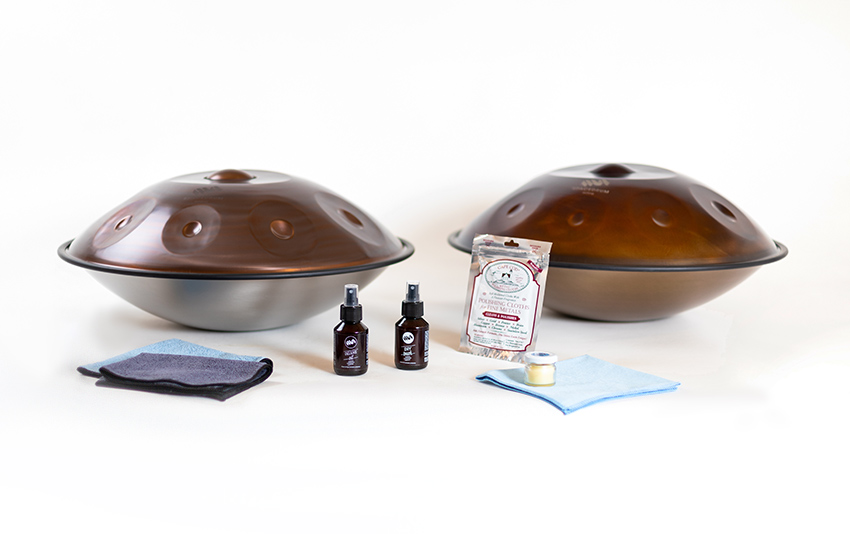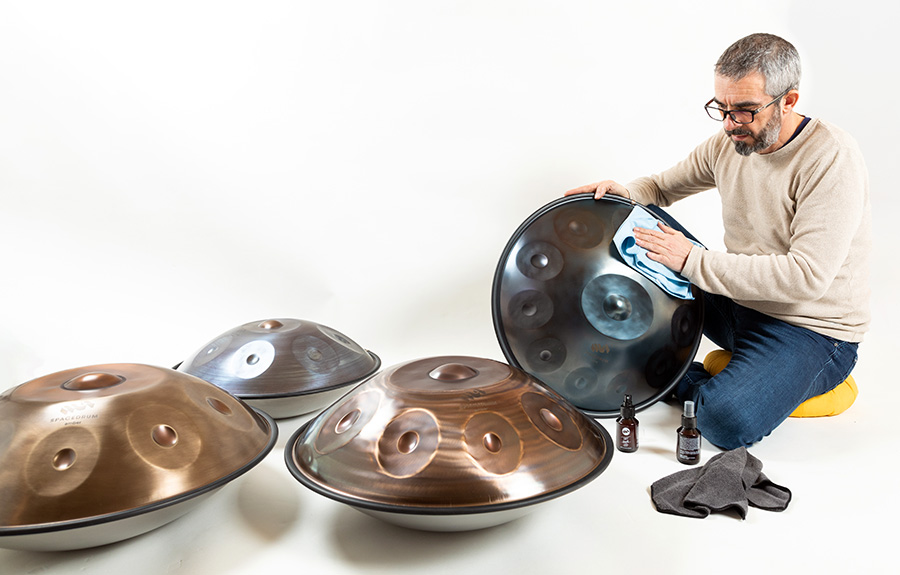How to clean and protect your handpan?
You are the proud owner of a handpan, and you are wondering how to properly maintain your instrument? Although a quality handpan is structurally quite resistant, it requires, like any other musical instrument, that you take care of it. By taking a few precautions, and avoiding certain risky situations, your handpan should stand the test of time without too much trouble. There remains the tuning, a very sensitive issue for this type of musical instrument. Indeed, even if the material used for its construction is flexible and solid, your instrument is not immune to seeing one (or several) notes go out of tune because of a shock or an unsuitable playing technique.
Here we provide you with all the keys to adopt a flawless maintenance routine for your handpan!

The rules to follow to take care of a handpan
You may not know it, but the metal sheet used to make a handpan is at most 1.25mn thick. The dome of your instrument is therefore more fragile than it seems. Let's get straight to the point and talk about the basic principles that must be applied to keep your handpan in good condition for a long time. Another advantage of following these tips is that you will reduce the frequency of re-tuning at the manufacturer's, thus saving time and money.
Avoid contact with blunt objects
Never play the handpan if you are wearing rings on your fingers. The same applies to any metal accessories (jewellery or belts) that could come into direct contact with your handpan. A shock on a note with a metal object (or any hard object for that matter) could have serious consequences on the tuning of your handpan. A scratch can also happen quickly if you are not careful when playing with your bare hands. So just have the right reflex, remove your jewellery before playing and remember to tell the people you lend your handpan to.
Of course, make sure that no one hits the instrument with a wooden stick or any other object that could mark and/or detune the handpan.
Have a proper playing technique
As explained above the handpan is a percussion instrument with a very thin vibrating membrane. It is therefore advisable to play gently and with a good touch. Indeed, playing too "roughly" can really detune your handpan. Listen carefully and if it sounds bad (the sound of the notes becomes saturated or gives an inappropriate effect) reduce your striking force. The use of sticks is possible but under certain conditions. If you wish to play with sticks, remember to strike gently and use soft sticks to get the best sound from the instrument.
Wet and salty environments
If you live by the sea, or in a humid environment, it is essential that you adopt a regular maintenance routine. A tropical or marine environment is highly conducive to corrosion and rust. Avoid too long sessions on the beach if possible! If you have a handpan made of nitrided mild steel you are likely to see rust spots appear without regular maintenance of your handpan. So remember to clean and protect your handpan after playing, even if it is made of stainless steel, as some grades of stainless steel - ferritic stainless steel in particular - are less susceptible to corrosion!
Let your handpan breathe
If possible, do not store your handpan in its case if it is damp (or vice versa). As explained in the previous paragraph, humidity favours the appearance of rust spots or various stains.
And generally speaking, a handpan will always look better in the open air than in a case, so put it on a stand or use a wall mount when you are at home. The handpan is a designer instrument that does not suffer from being displayed in the right conditions.
We have written an article entitled "Where to store my instrument" with more detailed advice. Please check it out if you are looking for information on how to store your handpan properly.
Handpan and sun don't mix
It is strongly discouraged (not to say forbidden) to play the handpan in direct sunlight because of the risk of metal expansion. Although it may be difficult for people who want to enjoy a nice spring sun while playing in the open air, handpan players generally agree that handpans should not be played in the sun.
Be aware that taking the risk of playing the handpan when the metal is expanded by the heat is generally tantamount to de-tuning it. If you forget a handpan in the sun, or in your car in the heat of the day, simply put it in the shade and let it come back to room temperature. The expanded metal of the handpan "usually" regains its original structure and should sound fine again.
Cleaning your handpan
After playing the handpan, it is a good idea to wipe the instrument with a microfibre cloth on both sides of the shell. It's a habit you should get into, and it only takes a minute, but it will do your handpan a world of good! Thanks to this simple gesture, you will eliminate the traces left by your fingers, which in the long run can damage the metal (acidity from hand perspiration, sebum, mineral salts, dust and all other elements present on our hands as well as in the air).
How to clean and maintain the condition of your handpan
Maintaining a handpan is quite simple but requires some regularity! Here are the essential points to maintain a handpan and ensure it lasts longer.
Wipe the handpan after playing
As we have just mentioned in the basic rules, a handpan player who cares about the life of his instrument will take care to wipe it down immediately after playing (especially for nitrated mild steel models), ideally using a microfibre cloth. You can also use a clean cotton cloth but the important thing is to get into the habit and keep it up to ensure the longevity of your handpan.
Cleaning the handpan with alcohol
From time to time, depending on how much dirt has accumulated on your instrument (a thin layer of oil, dirt and sebum from your hands), consider wiping the entire surface of your handpan with a cloth soaked in alcohol. Take the time to rub the outside of the two shells, the edges, but also the inside of your instrument if you wish. Ideally, use rubbing alcohol or surgical spirit, which will be gentler on your instrument.
The alcohol will remove the existing protection on your instrument (oil or wax), so after cleaning, remember to reapply a layer of protection.
Protecting the handpan with oil
Once cleaned, it is essential to apply an oil or wax to protect your handpan.
Before doing so, check with your manufacturer for care instructions, as some instruments cannot be oiled. Depending on the metal and the nitriding, some handpans can be particularly porous, so they will absorb any oil you apply, which will eventually alter the sound of your handpan.
Avoid overly chemical and aggressive products from the metal industry such as 3in1 for example and use natural oils designed specifically for handpan maintenance. Metal Sounds has developed a special organic beeswax and two sprays (a DELUXE OIL protection oil and a DRY TOUCH dry oil dedicated to the cleaning and maintenance of handpans) for the maintenance of its handpans.
The frequency of application of protection, whether oil or wax, will vary according to the environment in which you live: in a humid climate, near the sea, apply protection at least twice a month. In a very dry environment, the frequency of application will be less, and you can go several months without applying protection without any problem if your handpan is of good quality and you wipe it down after playing.
Some handpans, such as those made of stainless steel, are particularly resistant and require little or no protection against rust. Oil can be applied, but at much greater intervals. Again, check with your manufacturer for advice.
Removing rust spots on a handpan
Despite all your good care, rust spots appear on your handpan? Don't panic, there are solutions!
First of all, clean your handpan with alcohol. Then take a sponge and with the abrasive side (the green side), which you will have moistened beforehand, rub the rusty spots gently. Keep in mind that this process should be used sparingly, as it can remove the oxidation layer of your handpan. It will be possible to remove recent rust bloom quite easily with this process.
If the corrosion has been there for a longer period of time and the abrasive side of the sponge is not enough you can use Cape Cod a soaked polishing cloth which works small miracles as the name suggests. Rub in a circular motion and the rust should come off. Obviously the aesthetics of your handpan may be altered but it's up to you if you want to remove the rust or not.
Once you have done this, clean your handpan well with alcohol to remove any rust residue that may still be on the surface. It is important not to leave any rust dust behind as it could contaminate your handpan again.
Now that you have removed the rust and applied a good coat of alcohol you should protect your handpan by applying a good dose of oil with a clean cloth.
So, as you can see, the best way to keep your handpan looking like new is to keep an eye on its condition and avoid rust spots developing on your instrument. But rest assured, with a little maintenance and good storage conditions, your handpan will be well protected and will last a long time.
Maintenance of Spacedrum® Metal Sounds handpans
In addition to all the advice given above on how to clean and protect your handpan, here are a few products that are necessary for the proper care of your Spacedrum:
- Stainless steel handpan (Spacedrum EVOLUTION / Spacedrum EMBER / Spacedrum TRAVEL)
We produce in our workshop a natural beeswax mixed with organic rapeseed oil. A 30 ml jar of wax is supplied free of charge with your Spacedrum Evolution. Do not hesitate to wax your instrument from time to time to keep a protective layer on it and keep its shine (see video below).
- Mild steel handpan (Spacedrum NITRO)
Due to the type of steel used to manufacture the Spacedrum Nitro, it is more sensitive to corrosion than stainless steel models. Your Spacedrum Nitro handpan should therefore be maintained regularly and thoroughly by applying a natural wax or oil dedicated to the maintenance of handpans.
Metal Sounds supplies two 50 ml bottles of oil (Deluxe Oil and Dry Touch) free of charge with each Spacedrum Nitro. This ensures that the handpan is well cared for right from the start.
To find out how to apply our care products, take a look at our tutorial:
Did you like this article? Would you like to receive more information about the handpan? Subscribe to our NEWSLETTER below!




